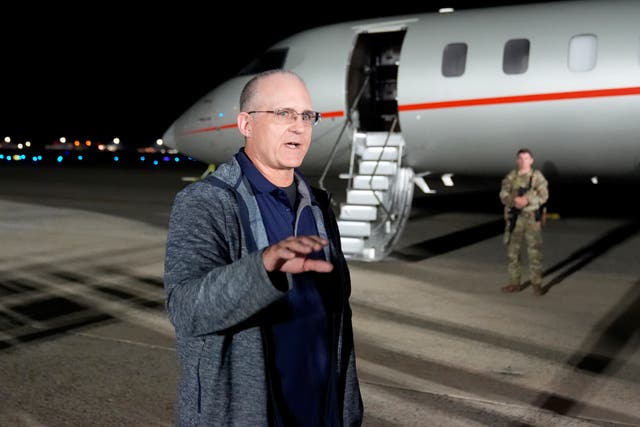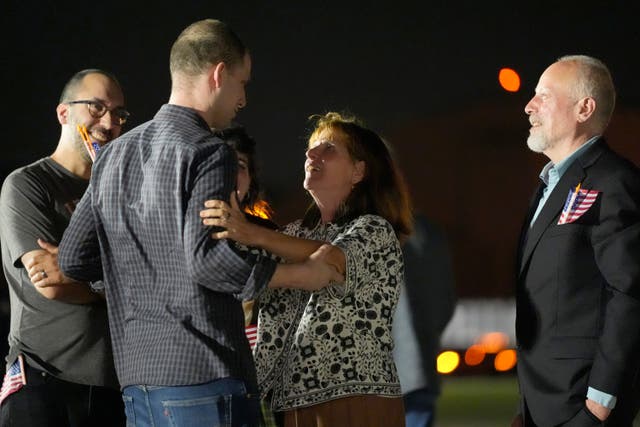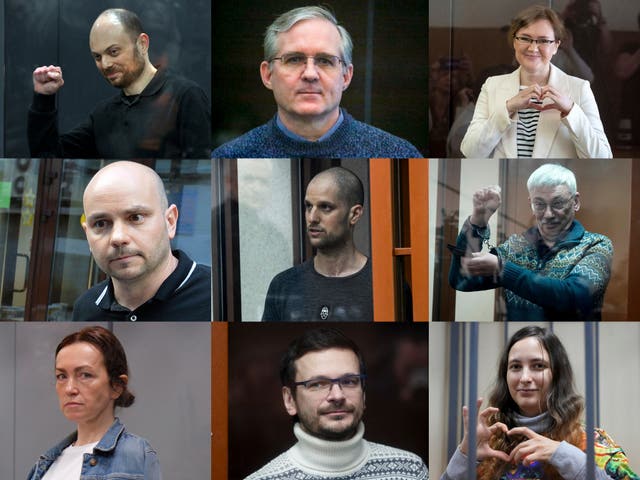The United States and Russia have completed their biggest prisoner swap in post-Soviet history, with Moscow releasing Wall Street Journal reporter Evan Gershkovich, security consultant Paul Whelan, who has Irish and British citizenship, and dissidents including Russian-British national Vladimir Kara-Murza, in a multinational deal that set two dozen people free.
Mr Gershkovich, Mr Whelan and Alsu Kurmasheva, a journalist with dual US-Russia citizenship, arrived on American soil shortly before midnight for a joyful reunion with their families.
President Joe Biden and Vice President Kamala Harris were at Andrews Air Force Base in Maryland to greet them.
Negotiators in backchannel talks at one point explored an exchange involving Russian opposition leader Alexei Navalny, but after his death in February ultimately stitched together a 24-person deal that required significant concessions from European allies, including the release of a Russian assassin, and secured freedom for a cluster of journalists, suspected spies, political prisoners and others.
Mr Biden praised the exchange, by far the largest in a series of swaps with Russia, as a diplomatic feat while welcoming families of the returning Americans to the White House.

“Deals like this one come with tough calls,” Mr Biden said.
He added, “There’s nothing that matters more to me than protecting Americans at home and abroad.”
Under the deal, Russia released Mr Gershkovich, The Wall Street Journal reporter jailed in 2023 and convicted in July of espionage charges that he and the US government vehemently denied.

Also released was Mr Whelan, a Michigan corporate security executive jailed since 2018, also on espionage charges he and Washington have denied, and Ms Kurmasheva, a Radio Free Europe/Radio Liberty journalist convicted in July of spreading false information about the Russian military, accusations her family and employer have rejected.
In a statement, Mr Whelan’s family said: “Paul Whelan is free. Our family is grateful to the United States government for making Paul’s freedom a reality.”
The dissidents released included Mr Kara-Murza, a Kremlin critic and Pulitzer Prize-winning writer serving 25 years on charges of treason widely seen as politically motivated, as well as multiple associates of Mr Navalny.
Freed Kremlin critics included Oleg Orlov, a veteran human rights campaigner convicted of discrediting the Russian military, and Ilya Yashin, imprisoned for criticizing the war in Ukraine.

Throughout the negotiations, Moscow had been persistent in pressing for his release, with Mr Putin himself raising it.
At the time of Mr Navalny’s death, officials were discussing a possible exchange involving Mr Krasikov. But with that prospect erased, senior US officials, including national security adviser Jake Sullivan, made a fresh push to encourage Germany to release Mr Krasikov.
In the end, a handful of the prisoners Russia released were either German nationals or dual German-Russian nationals.
Russia also received two alleged sleeper agents jailed in Slovenia, as well as three men charged by federal authorities in the US, including Roman Seleznev, a convicted computer hacker and the son of a Russian lawmaker, and Vadim Konoshchenok, a suspected Russian intelligence operative accused of providing American-made electronics and ammunition to the Russian military.
Paul, Evan, Alsu, and Vladimir were unjustly held in Russia in an appalling perversion of justice.
They and their families have shown incredible courage in the face of devastating circumstances — and they will soon be reunited with their loved ones. pic.twitter.com/9gIVdxJdCq
— Vice President Kamala Harris (@VP) August 2, 2024
Norway returned an academic arrested on suspicions of being a Russian spy; Poland sent back a man it detained on espionage charges.
“Today is a powerful example of why it’s vital to have friends in this world,” Mr Biden said.
Six countries released at least one prisoner and a seventh — Turkey — participated by hosting the location for the swap, in Ankara.
The Biden administration has now brought home more than 70 Americans detained in other countries as part of deals that have required the US to give up a broad array of convicted criminals, including for drug and weapons offences.
The US government’s top hostage negotiator, Roger Carstens, has sought to defend the deals by saying the number of wrongfully detained Americans has gone down even as swaps have increased.
Ms Tucker, the Journal’s editor-in-chief, acknowledged the debate, writing, “We know the US government is keenly aware, as are we, that the only way to prevent a quickening cycle of arresting innocent people as pawns in cynical geopolitical games is to remove the incentive for Russia and other nations that pursue the same detestable practice.”
Though she called for a change to the dynamic, “for now,” she wrote, “we are celebrating the return of Evan”.






